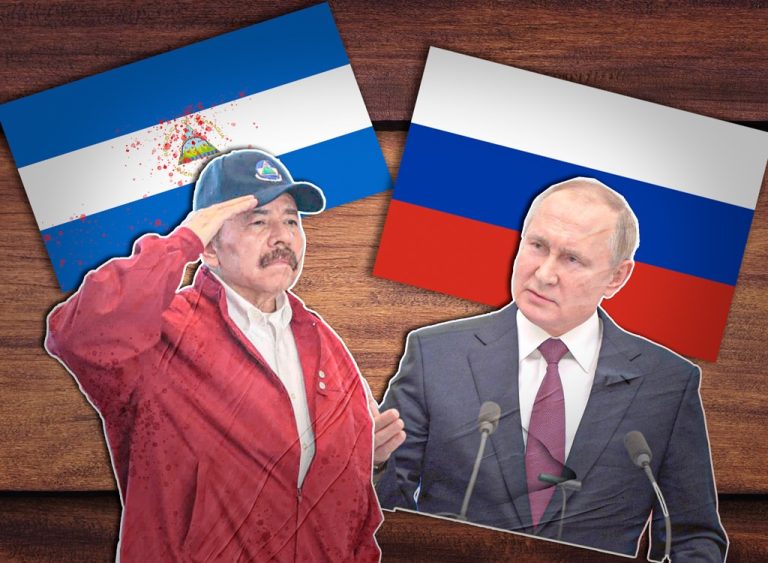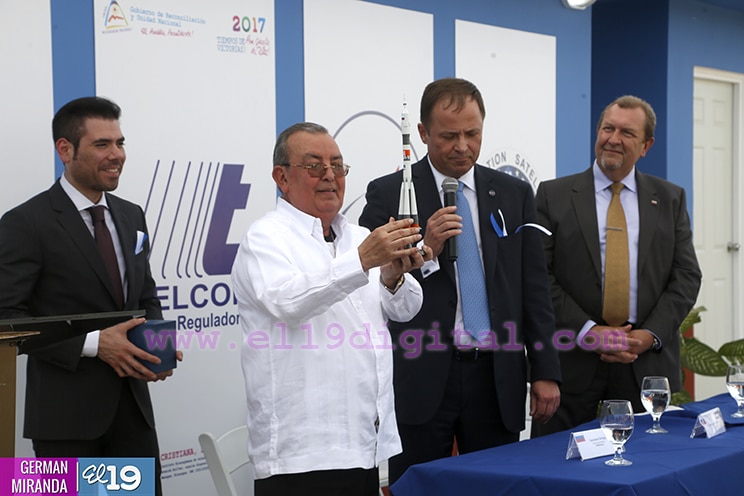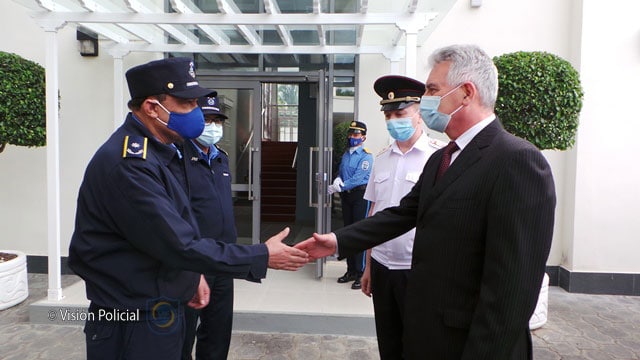1 de marzo 2022

The Return of the Military

PUBLICIDAD 1M
PUBLICIDAD 4D
PUBLICIDAD 5D
Moscow has authority to respond to alleged threats to international information security from Nicaragua, according to an agreement signed in 2021

For more than a decade, Sandinista dictator Daniel Ortega has carefully cultivated his rhetoric against the United States and the European Union, to project an image of a revolutionary defender of sovereignty, but has gradually made important security concessions to Russia that favor his interests, offering the country as a platform for his ally in the region.
In late January 2022, Russian President Vladimir Putin announced that he would strengthen his "strategic cooperation" with Nicaragua, Venezuela and Cuba. And so, in the midst of the tensions in the world generated by his attempt to forcibly annex Ukraine, he showed Nicaragua as one of the pawns on the Russian chessboard in a geographic zone that has historical U.S. influence.
The Ortega regime endorsed Putin’s deployment of troops in Ukraine on February 21, which coincides with the 88th anniversary of the assassination of General Augusto C. Sandino, a national hero and symbol of anti-interventionism in Latin America. That same day, Ortega dedicated his speech to justifying the Russian aggression days after he prefaced his support to Vice Prime Minister Yuri Borisov, an emissary of Putin who arrived in Managua and promised him an increase in military and commercial cooperation, without giving a concrete figure.
The main agreements approved in the National Assembly over the last eight years reveal the progress of Ortega's concessions to Russia, gradually and steadily, until the signing of the agreement on cybersecurity in 2021, an area in which Russia has had a reputation for participating in attacks against the United States, which has even sanctioned it for attempting to influence that nation's elections.
The cybersecurity document, accepted by Nicaragua, empowers Russia under the concept of mutual collaboration to respond with joint measures to eventual international information security threats to the Central American country (Article 1, paragraph 3), one of them foreign interventionism, disturbing public order and the strange concept of harm being caused to the “spiritual environment of other states” by disseminating information.
Ortega has fueled the foreign enemy discourse since 2018, when he launched a campaign of repression against Nicaraguans who demanded a change of government, which his regime labeled, without evidence, as a failed coup attempt.
The Inter-American Commission on Human Rights (IACHR), attached to the Organization of American States, documented the murder of 355 people, 2,000 were injured and 100,000 exiled.
Ortega accused in November 2021 the imprisoned opposition leaders of being “sons of bitches of imperialism”. But while the international community demanded respect for human rights, Russia has maintained its claim on Nicaraguan “sovereignty” as one of the points for the relaunching of the political alliance between Ortega and Putin.
In fact, the Russian Government welcomed Rafael and Laureano Ortega -sons of the Nicaraguan president- in a diplomatic mission on July 19, 2021, when the 42nd anniversary of the Sandinista revolution was being commemorated and Ortega was internationally isolated at his political party event.
The legislative documents consulted clearly expose the advance of Russian interests in Nicaragua in the commercial, pharmaceutical, military-police areas and have promised to exploit nuclear energy for non-military purposes, in pompous announcements that have served to feed the propaganda machine of the Sandinista Administration, which has been delegitimized internationally by Ortega’s reelection for a fourth consecutive term without democratic guarantees.
“Who has the capacity to deal with threats - Nicaragua? The one who has it is Russia”, an IT specialist says frankly about the bi-national agreement entitled “Agreement between the Government of the Republic of Nicaragua and the Government of the Russian Federation on collaboration in guaranteeing international information security” signed on July 19, 2021.
The analyst maintains that this document not only represents a problem for the citizens because of its wording, but also because of who interprets it, which conspires against opponents and civil society, given the concepts defined as threats to the “international security of information coming from the information and communication technologies used”.
Among the threats, the following are mentioned: a) acts against the sovereignty, security and territorial integrity of States, b) terrorist purposes, c) illicit access to computerized information, d) interference in internal affairs and disturbing public order, and e)disseminating information that inflicts damage to the socio-political system and socio-economic system, as well as to the spiritual, moral and cultural environment of other States.
“They go against all kinds of information that they do not want to be disseminated. Russian assistance is implicit. The Federation is becoming a protector of Nicaragua towards threats, what happens is that the definition of threats is so broad that they can take action against a large number of information disclosures”, considered the expert, who asked not to reveal his identity and emphasizes that Ortega is giving “carte blanche to Russia to monitor” information in the country.
In 2021, Ortega's regime obliged telephone companies to keep users' data for one year according to a regulation for data preservation, approved by the National Assembly, which could be requested by the authorities using the Special Law on Cybercrimes or “Gag Law”, which is used as an instrument to persecute, imprison and convict opponents and Nicaraguans in general, against the right to freedom of expression.
It is the most enigmatic of the Russian projects in the country and its operation has always been under suspicion. “It is not for spying on anyone,” said Orlando Castillo, the then director of the Nicaraguan Telecommunications Institute (TELCOR), in 2017.
The satellite ground station “La Gaviota” - the nickname of Soviet astronaut Valentina Tereshkova - is located near the Nejapa Lagoon, located three kilometers from the headquarters of the US Embassy and is the only one of its kind installed in Central America, although Russia also has four similar ones in Brazil and others in Cuba.
It is a satellite monitoring system that links the ground station with 24 Russian satellites, five of which would be emitting continuous information to Nicaragua; supposedly useful for the fight against drug trafficking and the land management system, according to official information.
In technical terms, the system is similar to the U.S. Global Positioning System (GPS) or the European GALILEO, although there are differences in the origin of each one.
“GPS and GLONASS originated in the military field and have been given applications for civilian use. GALILEO, on the other hand, originated in the civilian sphere and was later modified to a great extent to enable it for military use”, explained another specialist consulted for this analysis.
The station is administered in Managua by the Russian Space Agency, known as Roscosmos. However, the expert points out that the personnel there is made up of both civilians and military personnel, while the operational and administrative control is carried out by the Russian diplomatic mission in the country.

Laureano Ortega Murillo, son of Nicaragua's president, with the then authorities of Telcor and the Russian embassy in Managua during the inauguration of the satellite station in 2017. Photo/19 Digital
One name stands out among them all. The military attaché is Lieutenant Colonel Oleg Surov, who is also the director of the Russian police training center where other public security commanders from the Central American region come to be educated in the fight against drugs.
“The Russian station in Managua has been equipped with an antenna system which demonstrates that it works in the reception and interception of radio signals in other frequency bands. It is a small number, however, it has been provided with fiber optic trunks that can perfectly be used to install antennas in other places in Managua or even the whole country and take the signals to the station where they can be processed and analyzed”, adds this telecommunications expert.
According to the specialist, Nicaragua has good experts in computer security, but they have no preparation in intelligence for the digital processing of radioelectric signals. Russian support with the Army and the Police is limited to the fight against drug trafficking, which explains in part why state institutions have been subject to cyber attacks months ago, a situation aggravated by the ignorance of those who occupy positions in the State, most of them “recommended by the vice-president”.
“As far as I know, no cyberattacks have been reported from the station to networks in the United States. The station is for listening and digital processing of signals linked to intelligence, although I do not rule out that it could be used as a center of origin for cyber-attacks. An attack of this type is very difficult to mask in the little international traffic that Nicaragua has”, he said.
At present, the regime does not have a national information security policy. The expert confirmed that the station is installed there because of the proximity of the US radio stations, but also because the old Intersputnik station of the eighties was there, which was modernized and taken away from ENITEL, which was the owner by virtue of the privatization of the nineties.
If the possibility of carrying out computer espionage, or through interception, are probable realities according to the sources consulted, the head of the Army, General Julio César Avilés, and the Russian Minister of Defense signed another agreement in 2015 that facilitates the docking of Russian ships in Nicaragua.
A note from the Sputnik agency, dated February 2 of that year, indicates that, according to the Russian Minister Serguei Shoigu, bilateral military cooperation is facilitated with this. However, the details of the agreement are unknown.
“Russian ships can refuel in Nicaraguan ports without prior permission, this is to load water, food and other types of supplies, not military, at the time of a conflict it puts you on Russia's side by agreement. You have this and another series of agreements that have strengthened this relationship”, said Núñez.
The scope of Nicaragua's commitment with Russia has not been explained by anyone in Nicaragua. The same secrecy surrounds operations to strengthen Nicaragua's military capacity, an aspiration that military commanders have expressed based on 1980s ties with the USSR.
Security expert Roberto Cajina, one of the best known in Nicaragua, said in an article in envío magazine from 2016 that a “remilitarization of Nicaragua” was taking place, which would be occurring in parallel to Russia's geostrategic repositioning.
“The basic question tries to understand the logic, if any, of the recent acquisition that Nicaragua has made of military means and equipment from the Russian military industry: tanks and warplanes, rocket ships and maritime patrol boats, a decision of high impact both in our country and in Central America and, to some extent, in the Western Hemisphere. If Nicaragua is not at war and there is no evidence of an eventual conventional war, why has the government of Daniel Ortega acquired such war material, both offensive and defensive?” questioned Cajina.
The Russian Interior Ministry's training center in Nicaragua has provided courses in 2020 to the local Police on “combating crimes in the field of computerized information” according to a press release from the Russian embassy in Managua.
According to the document, the graduation of police officers in that subject was attended by the director of the training center, Oleg Surov, and the deputy director of the Police, Commissioner General Ramon Avellan, pointed out for leading Operation Cleanup that cost the deaths of dozens of people in the months leading up to July 2018.

Commissioner General Ramón Avellán, deputy director of the Police - accused of committing crimes against humanity - greets Russian authorities in Managua during the graduation of officers who participated in a course on "fighting crimes in the field of computerized information", held in December 2020. Photo/Police Vision
The path for this training center was backed by the agreement in the area of “professional improvement of personnel in the area of narcotics, psychotropic substances and their precursors” signed in 2013 and valid for ten years by the then first commissioner Aminta Granera, head of the Nicaraguan Police, and a representative of the Russian Federal Drug Control Service.
According to the published note, the scope of the training center is regional and the site would train police officers from Central America. It was inaugurated in 2017. Despite the propaganda about it, experts do not find any other logic to the school other than that it enables intelligence gathering.
“That center is a good front to continue doing intelligence. Geopolitically there is no justification”, an analyst explained for this journalistic analysis. “There is no great incidence of organized crime from Russia to the region, we are not a producer country, but a transit country. There are no financial commercial transactions that demand such continuous intelligence work”, the analyst added.
This article was originally published in Spanish in Confidencial and translated by our staff
PUBLICIDAD 3M
Periodista nicaragüense, exiliado. Comenzó su carrera en el año 2000, cuando todavía era estudiante. Por sus destacadas investigaciones periodísticas ha ganado el Premio Ortega y Gasset, el Premio Internacional de Periodismo Rey de España, el Premio a la Excelencia de la Sociedad Interamericana de Prensa, y el Premio Latinoamericano de Periodismo de Investigación del Instituto Prensa y Sociedad (IPYS).
PUBLICIDAD 3D